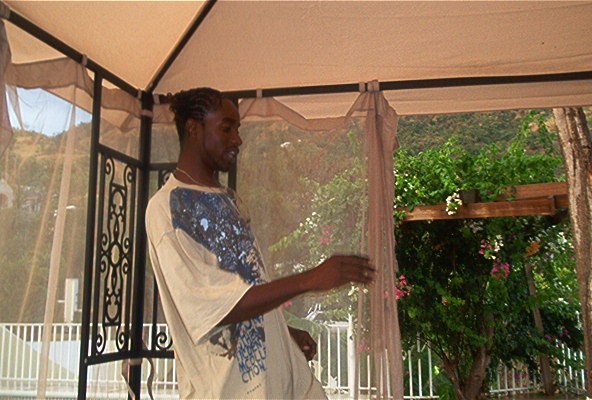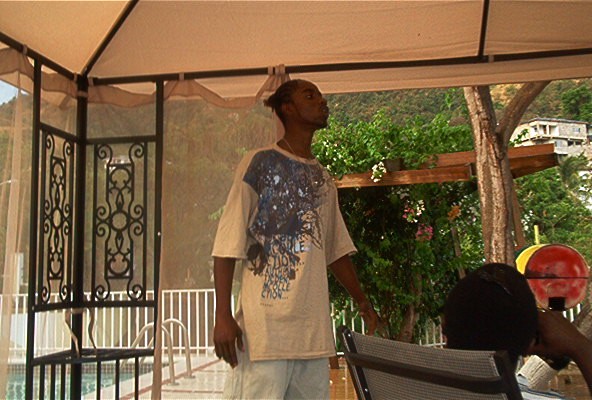wha gwaan, etc.

as i mentioned last post, i didn't get a chance to hit any dances on this most recent whirlwind trip to kingston. but as always, i did have my ears and eyes open.
one thing that did catch my ears right away was the latest re-lick of the "mad mad" riddim. readers of this blog will know that the "mad mad" is a minor obsession of mine because of the way that, like other big riddims, it can illustrate in an intensely audible manner the stylistic shifts over the last 4 decades of jamaican music (and 2 decades of hip-hop). other listeners out there might know the "mad mad" as the "diseases" riddim, or the "johnny dollar," or the "golden hen"--named after versions of the riddim made popular by michigan & smiley, roland burrell, and tenor saw, respectively.
what caught my ear about this latest version of the "mad mad" is that is it clearly a part of the "golden hen" lineage, as defined by its instantly recognizable horn-line. other than that, the new version--which i believe the radio DJ referred to as the "dutty rub" riddim--falls, production-wise, into the new camp of rootsy/one-drop riddims (e.g., drop leaf, anger management, lion paw, etc.) that are currently enjoying such favor in the dancehalls. (and that's another thing my ears picked up: these "new roots" tracks, some of them a year old now, still have the place on lock, and young singers such as i wayne, fanton mojah, bascom x, and their bredren remain big favorites. the uptempo bashment stuff is still big, but it's no longer hegemonic as it was a year or two ago. and there is clearly some excitement inna JA about this so-called renaissance.) i have been hoping that along with this "return to roots" we will see a return to some of the classics dem, and i think it's just a matter of time before we see a whole slew of digital, post-dancehall (if you will) re-licks of the big studio one riddims that are to dancehall producers what tin pan alley songs were to beboppers.
the only voice i recognized on the "dutty rub" was elephant man's. (i only caught two tracks.) of course, ele has voiced on the "mad mad" before, but only on dubplates--far as i know--so it will be exciting to see how many of the newer crop of DJs and singers get to make their stamp on it. i'll also be curious, of course, to see who decides to make links to earlier versions, especially to memorable melodies such as yellowman's zunguzung meme.
the other thing that my ears took in was the reigning ubiquity of hip-hop on the island. of course, there were the latest jams from 50 cent and such, but one thing that struck me was how certain older tracks/artists remained a part of the soundscape--biggie smalls in particular. while at hellshire beach i observed a crowd of young men going crazy for "notorious" (from 1999's born again), and later, cruising through barbican, i overheard a cut from 1994's ready to die. clearly, hip-hop is not merely a fad, merely pop in jamaica--it is something that people have been seriously engaging for a minute. of course, this is not news to anyone who attends dances in kingston or picks up the latest mix-tape.
and speaking of mix-tapes, it's clear that the hip-hop format for bus(t)ing new artists and new tracks has been fully embraced by the digital-denizens of kingston. paralleling young jamaican video artists' use of found footage (the war in iraq being a particularly popular source of images to counterpose with the ghetto) and video game graphics, among other things, young mixtape makers are increasingly incorporating not simply the classic sounds of jamaican soundsystems (e.g., screaming selectors, big-ups from bigman-DJs, gunshots, and low-fi mixer effects) but everything from silly fruityloops sounds to the latest hip-hop beats to sizzla's signature "HAAA!" or killa's "CROSS..." to--the clear new favorite--clips from the twins of twins' highly popular dancehall parodies.
for those who don't know the twins of twins yet, they've been working as song-writers, performers, and dub-mediators for a while now, but they seem to be blowing up of late with their mixtape series (which i believe is now up to volume 5), in which they imitate and skewer a number of jamaican personalities and musicians as well as american pop stars. the social commentary and cultural critique that results is usually pretty sharp and often hilarious. sure, the set-ups are not the most original--r.kelly and mutabaruka are likely to disagree about sexual mores and michael jackson is not going to be black or man enough for most jamaicans--but they are well-executed. and the youth dem love it. i heard a 16-year-old kid recite verbatim what must have been a ten-minute long segment, reproducing the various voices as well. what i loved most about the twins of twins style is the way that they deconstruct various stereotypes by indulging in them to a ridiculous extent. i'd like to think this fosters a kind of critical media reception even when the jokes themselves tend to reinforce machismo, homophobia, and xenophobia, among other "national values."
at any rate, the stuff is flying around the kingston soundscape right now and samples from the twins of twins tapes make truly effective, and ubiquitous, drops for mixtapes these days (as heard in the twins of twins clips above, all of which come from a "cd-master" mix i copped at hellshire beach). on the cassia park mixtape, one hears carefully selected twins-of-twins drops ("the following artistes are rated 'g' for gangster"; "badmind make this song here not come to the fore") and, significantly, a number of hip-hop-gen kingstonians waxing local over recent hip-hop instrumentals--sometimes very recent ones, as on the "candy shop" versions. here's a clip, featuring wasp over the "dreams" beat (well before the game's song entered serious rotation in the states). and check this twins-drop into an appropriate capleton track--and one that, significantly, draws a major line in the sand between hip-hop (e.g., busta and usher) and real righteous reggae, rasta. (love the way king shango stutters through the beginning of the first verse, almost flabbergasted by the use of the n-word.)
the twins of twins approach to comedy--especially their celebrity roasts--clearly emerges from a wider fascination with jamaica's stars and their various feuds, which are frequently recounted, often in hilarious detail. while we took a break from the video shoot, dami d entertained us with his re-enactment of a tension- and comedy-filled buju-ninja encounter.

[can you guess which is buju and which is ninjaman?]

[yup, that's ninja in the second pic, saying something like, "buju--me nah wan deal wit no fuckery," after buju had instructed his yard-men to let loose the dogs on ninja and his uninvited entourage.]
one thing my ears did not catch in kingston was any reggaeton. i find this kind of odd considering both reggaeton's popularity on the US pop charts (which exert quite an influence on jamaica's soundscape) and its aesthetic overlap with dancehall. perhaps it's a matter of time. or perhaps the language barrier will prove to be too much. (jamaica, despite its proximity to and historical links with cuba, panama, belize, etc., seems to have an almost invisible spanish-speaking population.) i'm not sure. but i know that when i tried to play daddy yankee for dami d and some friends, they didn't recognize it, despite the fact that i can't turn on 94.5 without hearing it these days (or that the most common google search bringing people to my syllabi in the last three months is some combination of "daddy yankee" "gasolina" "translation").
ditto for grime: heads weren't feeling dizzee, wiley, kano, et al., though they were into the forward/pow refix once they heard busta on it. (on a related note, i sent down a copy of dizzee's "boy in da corner" last year and it was received cooly. i was a little disappointed my bredren couldn't appreciate the "black atlantic" links or hear the way contemporary black london sounds--in a way--so damn jamaican, but i think they found it to be a little too weird for their tastes. the time may come yet. soon as jay-z brings the live-o hardcore worldwide, which seems like a matter of time.) they did, however, call for a pull-up on "original nuttah," which i played after the grime got little rise. (jungle still hasn't got a proper airing in jamaica.) they definitely heard this as the jamaican-london ting done well. my friends also dug the MIA video for "galang," though mostly because they thought she was cute.
the final observation i'd like to discuss here is the remarkable resonance of city of god in kingston. despite being an independent/foreign film (which are not popular in jamaica), i heard various folks mention it on a number of occasions. clearly it has been circulating and people find its representation of ghetto life to be pretty compelling. (i wouldn't be surprised if we start to see clips from the flick interspersed with scenes from downtown kingston in some upcoming videos.) the appeal of sameness in representations of ghetto-life is one of the main reasons that jamaican youth are so drawn to hip-hop. (why grime wouldn't appeal also for this reason is another question, though again, it may be largely about exposure.) i still remember a hip-hop-inflected jamaican youth telling me that he was out to demonstrate that TG=QB [that's tivoli gardens and queensbridge for the acronym-challenged]. so far, so good. no one would deny that hip-hop and reggae are "ghetto musics," par excellance--at least in terms of how they've staked their claim to representing a certain slice of life. but if jamaicans are slow to feel the flow of their reggaeton bredren, i'm not sure that funk carioca will ever rock the bailes in kingston.



0 Comments:
Post a Comment
<< Home